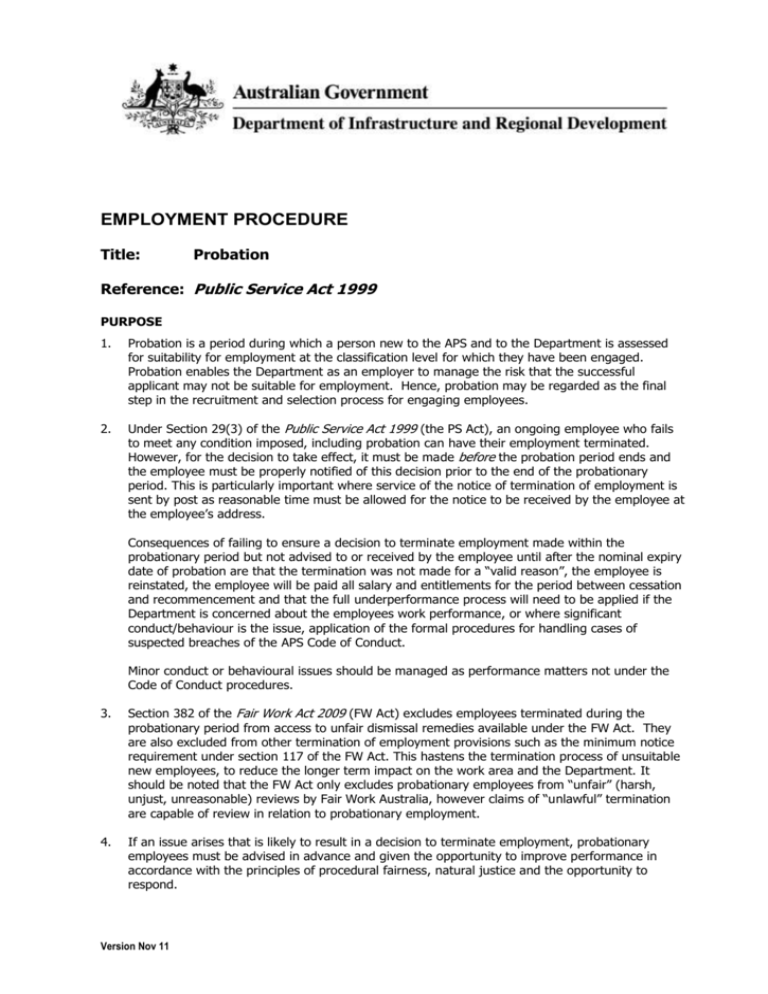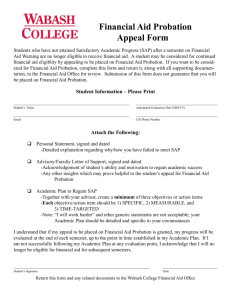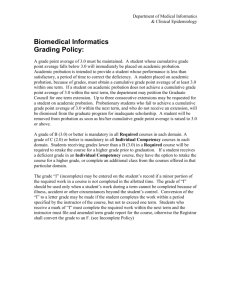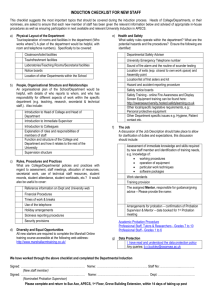DOC: 546 KB - Department of Infrastructure and Regional
advertisement

EMPLOYMENT PROCEDURE Title: Probation Reference: Public Service Act 1999 PURPOSE 1. Probation is a period during which a person new to the APS and to the Department is assessed for suitability for employment at the classification level for which they have been engaged. Probation enables the Department as an employer to manage the risk that the successful applicant may not be suitable for employment. Hence, probation may be regarded as the final step in the recruitment and selection process for engaging employees. 2. Under Section 29(3) of the Public Service Act 1999 (the PS Act), an ongoing employee who fails to meet any condition imposed, including probation can have their employment terminated. However, for the decision to take effect, it must be made before the probation period ends and the employee must be properly notified of this decision prior to the end of the probationary period. This is particularly important where service of the notice of termination of employment is sent by post as reasonable time must be allowed for the notice to be received by the employee at the employee’s address. Consequences of failing to ensure a decision to terminate employment made within the probationary period but not advised to or received by the employee until after the nominal expiry date of probation are that the termination was not made for a “valid reason”, the employee is reinstated, the employee will be paid all salary and entitlements for the period between cessation and recommencement and that the full underperformance process will need to be applied if the Department is concerned about the employees work performance, or where significant conduct/behaviour is the issue, application of the formal procedures for handling cases of suspected breaches of the APS Code of Conduct. Minor conduct or behavioural issues should be managed as performance matters not under the Code of Conduct procedures. 3. Section 382 of the Fair Work Act 2009 (FW Act) excludes employees terminated during the probationary period from access to unfair dismissal remedies available under the FW Act. They are also excluded from other termination of employment provisions such as the minimum notice requirement under section 117 of the FW Act. This hastens the termination process of unsuitable new employees, to reduce the longer term impact on the work area and the Department. It should be noted that the FW Act only excludes probationary employees from “unfair” (harsh, unjust, unreasonable) reviews by Fair Work Australia, however claims of “unlawful” termination are capable of review in relation to probationary employment. 4. If an issue arises that is likely to result in a decision to terminate employment, probationary employees must be advised in advance and given the opportunity to improve performance in accordance with the principles of procedural fairness, natural justice and the opportunity to respond. Version Nov 11 Department of Infrastructure and Regional Development Probation 5. On commencement of employment, the supervisor and employee must establish a mutual understanding of the requirements of the position and the standard of performance and behaviour expected. This should reflect capabilities for the classification level as indicated in the Department’s Work Level Standards, Performance Guides and the Organisational Capability Framework. 6. The individual performance management system forms the basis of determining, monitoring and assessing a probationary employee’s performance. The length of the probationary period specified in the letter of offer to the employee is the period during which the probationary employee’s work performance, conduct/behaviour and attendance/absence are assessed to determine the employee’s fitness for continued employment and not the standard 12 month individual performance management cycle applicable to employees not on probation. 7. During the probation period, the supervisor must also assess the employee’s conduct. This should include consideration of the employee’s pattern of attendance/absence and their conduct/behaviour in terms of the APS Values and Code of Conduct. 8. Supervisors and employees should ensure there are ongoing informal discussions to monitor and discuss performance against the agreed requirements. 9. Where a probationary employee’s work performance standards fall below expectations the employee should not be transferred to different work or to a different position from that for which the employee was selected. If, after reasonable efforts have been made by the Department to assist the employee to attain and sustain the required level of performance, the employee is assessed as not meeting the standard, termination of employment is the proper course of action. 10. Probationers are excluded from salary progression under Clause F19 as the purpose of probation, amongst other things, is for a probationary employee to demonstrate they have attained and sustained the required level of work performance over the entire period of probation. Until the probationary period has concluded it cannot be determined whether or not the employee has sustained the required level of performance for the entire period of probation. PROCESS To whom does probation apply? 11. Probation applies to all ongoing employees engaged under the PS Act excluding the Secretary, SES employees and Statutory Office Holders. 12. Probation also applies to all non-ongoing employees for the first six months of continuous nonongoing employment. Continuous non-ongoing employment may comprise a single contract of employment or where the initial contract has been extended such that the total employment period is continuous. Probation applies in each case where new contracts of employment are issued that are not continuous with any previous period of non-ongoing employment unless the Secretary or their delegate decides to waive this requirement. 13. Probation also applies to employees who transfer from within the Department or move from another APS Department or Agency (where employed under the PS Act) if they were on probation at the time of transfer in which case the probation period will continue until completed. 14. Similarly employees who are promoted and are on probation at the time of the promotion will continue on probation until the end of the original probation period is reached. Length of probation period 15. The probation period is six months from the date of engagement unless the Secretary or their delegate has agreed to a shorter period. Version Nov 11 2 Department of Infrastructure and Regional Development Probation 16. This period provides the employee a reasonable opportunity to adapt to their new environment and gives supervisors time to make a reasonable assessment. 17. The period of probation for Trainee APS, Graduate and Cadet APS employees will be for a period determined by the Secretary or their delegate. Generally, this will be for the period of training/development that the employee is required to undertake. Exemptions from probation 18. No new APS employee should be exempt from a period of probation. There may be circumstances where the Secretary or their delegate decides to waive probation. For example, the Secretary or their delegate may decide that an ongoing employee who was initially engaged as a non-ongoing employee for at least three months need not go through a period of probation as they have already demonstrated their ability to perform the requirements of the job and that the employee complies with the conduct/behaviour and attendance/absence requirements of the Department. Extension of probation 19. Probation cannot be extended due to concerns about performance. Where performance issues arise that cannot be resolved during the probation period, the employee’s employment should be terminated. 20. The probation period may be extended beyond the initial period for an additional three months only in exceptional circumstances. 21. Justification for an extension of the period of probation may occur when the probationer has been absent with approval from work for a significant part of the probation period due to ill health, injury, accident or other approved leave. This is on the basis that the Department has not had adequate time to assess the probationer’s performance, attendance and conduct. 22. If the probation period is to be extended, the employee must be notified in writing of the extension prior to the expiry of the initial probation period. The notification must include the reasons for the extension and the date on which the extended probation period will conclude. Citizenship 23. If an employee being engaged is not an Australian Citizen and a condition of their employment is that they obtain Australian Citizenship the probation period may be extended. The period of the extension should be until citizenship is obtained and is subject to receipt of evidence that an application for citizenship has been submitted. Security Clearance 24. If an employee on probation requires a security clearance which has not been obtained prior to the completion of their probation period, probation may be extended until the security clearance is obtained. This is on the condition that the employee has lodged all the forms and supporting documentation with the Security Team in accordance with their letter of offer. Note: If a person's engagement is subject to obtaining citizenship or security clearance (under section 22(6) of the PS Act), and it becomes apparent that the person has not, or cannot, meet that condition, the person's employment may be terminated on the ground specified in section 29(3)(f) of the PS Act. Section 29(3)(f) specifies ‘failure to meet a condition imposed under subsection 22(6)’ as a ground for terminating the employment of an APS employee. Finalising probation 25. Towards the end of the probation period, the supervisor must consider whether the employee: Version Nov 11 3 Department of Infrastructure and Regional Development Probation has successfully completed probation by demonstrating that their performance, attendance and conduct have been satisfactory; or has not successfully completed probationary requirements in which case a recommendation will be made to the Secretary or their delegate to terminate employment. PROCEDURAL FAIRNESS 26. Any decisions regarding employment must be made in accordance with procedural fairness, natural justice and the opportunity for the employee to respond during the course of the employee’s probationary period. 27. Before any decision is made to terminate employment, the employee must be given the opportunity to respond to the concerns and issues that form the basis on which the Secretary or their delegate is considering termination of employment. 28. Where employees are not performing to the required standard during the probation period, they must be advised as soon as possible and given a reasonable opportunity to improve performance. This may be through formal learning and development activities or on the job training and support. RIGHT OF REVIEW 29. Employees who are terminated for failure to successfully complete a period of probation do not have access to remedies under sections 382 and 385 of the Fair Work Act 2009 for unfair dismissal on the grounds the termination was harsh, unjust and/or unreasonable. 30. However, any employee on probation may apply for a remedy on certain grounds prescribed as unlawful in sections 351 and 352 of the Fair Work Act 2009, for example, termination due to temporary absence due to illness or injury, membership or non-membership of a trade union, race, colour, sex, sexual preference, age, physical or mental disability, family responsibilities, pregnancy or religion. 31. For further information refer to the Australian Public Service Commission booklet, Termination of Employment (No 11, 2002). ROLES AND RESPONSIBILITIES Secretary or their Delegate 32. The Secretary or their delegate will: decide the probationary period (see section on ‘Length of Probation Period’ for further information). terminate the employment of a probationary ongoing employee in accordance with s29(3)(f) of the Public Service Act 1999 where the Secretary or their delegate is satisfied that the employee has failed to meet one or more of the employee’s probationary conditions of employment terminate the employment of a probationary non-ongoing employee by foreshortening the period of the contract of employment for failure to meet one or more of the probationary conditions specified in the employee’s contract of employment where it is practical to do so. Supervisor 33. The supervisor will: ensure the employee is aware of expectations in terms of performance, attendance and conduct; Version Nov 11 4 Department of Infrastructure and Regional Development Probation ensure the employee is given access to resources to enable them to demonstrate their ability to perform to the required level, including any learning and development activities; ensure the employee participates in the performance management process for the duration of the probation period and complete a Probationary Performance Plan; provide ongoing, regular feedback to the employee during the probation period; where the employee is not performing to the required standards, notify the People and Performance Branch promptly, assist the employee to improve performance to an acceptable level and advise the employee of the potential consequences of failing to attain and sustain performance at the required level; and finalise probation by making an assessment that the employee has attained and sustained the required level of performance, attendance and conduct or making a recommendation to the Secretary or their delegate that employment be terminated prior to the end of the probationary period for failure to meet one or more of the probationary conditions of employment. Employees 34. An ongoing employee will: demonstrate an ability to work at the required level as agreed with their supervisor; actively participate in the performance management process; and actively seek feedback from their supervisor regarding their performance. 35. A non-ongoing employee will: demonstrate an ability to work at the required level as agreed with their supervisor; actively participate in the performance management process where a performance agreement is in place; and actively seek feedback from their supervisor regarding their performance. People and Performance Branch 36. People and Performance Branch will: send out letters of offer; provide advice about the probation process to supervisors prior to employees commencing; provide support and advice to supervisors on issues relating to probation; provide advice to supervisors prior to dates about the mid cycle and end of cycle review dates; arrange for a health check if required; confirm the completion of health, security and citizenship checks; and prepare letters confirming completion of probation or termination of employment. PROCEDURES 37. The procedures for the probation process within the Department are summarised in the flowchart at Attachment A. Letter of Offer 38. Following a selection exercise, the Secretary or their delegate must advise Recruitment (by completing the Selection Panel Report in e-Recruit) of the following: name of successful applicant; position details - classification, position number, Division, Branch, Section; salary; commencement date; and Version Nov 11 5 Department of Infrastructure and Regional Development Probation length of probation. The default position of six months with a potential three month extension will be used in all letters of offer, other than trainee classifications such as Graduate, Cadet and Trainee APS where longer probationary periods are required. 39. Recruitment will send a letter of offer to the successful applicant detailing conditions of employment, including probation. 40. Recruitment will advise the Performance Management Team (PMT) which is responsible for monitoring probation in the Department. Recruitment will also provide a copy of the signed letter of acceptance to the PMT. Probationary Performance Plan 41. Prior to the employee starting the People and Performance Branch will advise the supervisor of the probation requirements and procedures. 42. On commencement of employment, the supervisor must initiate the probation process by having a performance discussion with the employee and jointly develop a Probationary Performance Plan. This should occur as soon as practically possible, ideally within the first two of weeks of employment. 43. The supervisor and employee should refer to the departmental Work Level Standards, Performance Guides and Organisational Capability Framework, and section/business plans when developing the Probationary Performance Plan. They should also refer to performance management guidance material on the intranet. Probationary Mid Cycle Review (three months) 44. A mid cycle performance exchange discussion between the supervisor and employee should occur three months after the commencement of employment. The mid cycle review component of the probationary performance plan must be completed. 45. The People and Performance Branch will advise the supervisor prior to the mid cycle review of the procedures. 46. The supervisor should advise the People and Performance Branch if there are any concerns at this stage. If issues have been identified they should be addressed as soon as possible by the supervisor. The People and Performance Branch will assist the supervisor to develop appropriate strategies. 47. If issues have been identified at the three month stage and reported to the PMT, the PMT will follow up with the supervisor at the five month stage. 48. If at this stage the employee does not meet the performance, attendance and conduct requirements and the supervisor recommends termination, the supervisor should refer the matter to the Secretary or their delegate (SES Band 2) for approval and advise the People and Performance Branch. The People and Performance Branch will assist the Secretary or their delegate to manage the termination process. Note: for decisions concerning termination to take effect, the employee must be notified in writing by the Secretary or their delegate before the probation period ends. An employee who is not notified will be deemed to have successfully completed the probationary period. Version Nov 11 6 Department of Infrastructure and Regional Development Probation Probationary End-of-Cycle Review 49. During the last month of the probation another performance exchange discussion should take place. The end of cycle review part of the Probationary Performance Plan must be completed at this stage. Finalise Probation Period 50. Where the employee meets the requirements for employment, the supervisor must complete the Probationary Performance Plan which the EL2 manager must countersign if the supervisor is below the EL2 level. This must be forwarded to the PMT at the end of the probation period. 51. The PMT will ensure the probationer has successfully completed all other probation requirements i.e. health and security checks and citizenship. 52. On confirmation from Payroll Services the PMT will send a formal letter advising the employee that they have successfully completed the probation period. It should be noted that the probationary period automatically ceases at the end of the prescribed period and that the written advice is sent as a matter of courtesy. This finalises the probation process. 53. The PMT will forward all documentation to Payroll Services who will place it on the employee’s personnel file and update the payroll system. DEFINITIONS APS employee is an employee engaged under sections 22 or 72 of the PS Act, but does not include an SES employee. Delegate is the person who has the authority to make the decision on engaging and/or terminating the employment of a probationary employee. Employment means employment as an APS employee. Engagement means the engagement of either an ongoing or a non-ongoing employee in accordance with Section 22 of the PS Act. FW Act means Fair Work Act 2009. Movement means the movement of an ongoing employee between agencies. The move will be associated with the assignment of duties at a similar, higher or lower classification. Non-ongoing APS employee means an APS employee who is engaged for a specified term or for the duration of a specified task. Ongoing APS employee means a person engaged as an ongoing APS employee as mentioned in paragraph 22(2)(a) of the PS Act. Performance Exchange is a discussion in which the supervisor and employee participate in interactive and constructive two way feedback about performance and expectations. Promotion means the assignment of ongoing duties to an ongoing employee at a higher classification level. PMT means the Performance Management Team, People and Performance Branch. Version Nov 11 7 Department of Infrastructure and Regional Development Probation RELATED EMPLOYMENT PROCEDURES AND PUBLICATIONS Public Service Act 1999 Fair Work Act 2009 Probation, No 13, 2003 Termination of Employment, No 11, 2002 Values in the Australian Public Service, No 1, 2nd ed. 2002 Performance Management Supervisor’s Checklist for Inducting New Employees Recruitment Work Level Standards Organisational Capability Framework Performance Guides Additional resources for new starters and supervisors on ENTR Author: People and Performance Branch Authorised by: Secretary Version Nov 11 Date: 22 Nov 2011 Date: 22 Nov 2011 8 Department of Infrastructure and Regional Development Version Nov 11 Attachment A Probation 9




